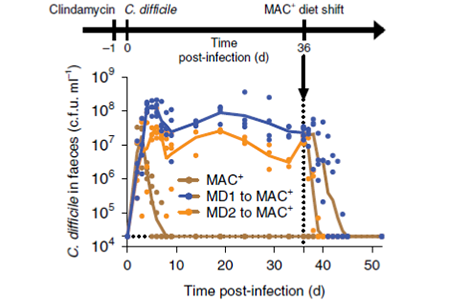
Humanized microbiota Swiss Webster mice infected with C. difficile
efficiently clear the pathogen when maintained on a diet with
microbiota-accessible carbohydrates (MAC+), but remain persistently
infected when on a MAC-deficient diet (MD1, MD2). Switching from a
MAC-deficient diet promotes rapid pathogen clearance. Figure from
Hryckowian et al.1
Hryckowian et al. generated humanized microbiota mice by colonizing germ-free Swiss Webster mice from Taconic Biosciences with healthy human donor microbiota. In an antibiotic-induced C. difficile infection model, the humanized microbiota mice maintained on a diet containing microbiota-accessible carbohydrates (MACs) efficiently cleared the pathogen, whereas humanized microbiota mice maintained on a diet deficient in MACs had persistent infection for a prolonged period. Similar results were observed in conventional microbiota Swiss Webster and C57BL/6NTac mice as well as germ-free Swiss Webster mice which were associated with a conventional mouse gut flora1.
The researchers hypothesize that MACs may act in two ways to control C. difficile:
- MACs may drive growth of gut bacteria which use MACs, suppressing C. difficile growth.
- MAC metabolism produces short chain fatty acids, which also suppresses C. difficile.















.jpg)

.jpg)
.jpg)
.jpg)
.jpg)





.jpg)


.jpg)
.jpg)

.jpg)


.jpg)





.jpg)

.jpg)




